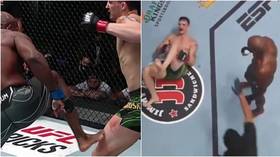Boxing clever? Evander Holyfield’s comeback shows nostalgia and pay-per-view dollars supersede sport’s credibility
As more figures turn up their noses at the ring return of the 58-year-old Evander Holyfield this weekend, does boxing's latest pursuit of nostalgia risk not just its credibility but also the health of its most beloved icons?
This time last year, social media was awash with giddy excitement about the impending return to the boxing ring of the Baddest Man on the Planet. Mike Tyson, some 15 years since his last boxing match, flooded Instagram with carefully manicured clips showing that little of his trademark speed and power had abandoned him during his exile from the sport.
Why, then, does it feel so different today on the eve of Holyfield's own career renaissance as he attempts to turn back the clock in a fight with ex-UFC star Vitor Belfort, a fighter whose boxing experience is dwarfed by that of his opponent?
To be blunt, Holyfield's own sizzle reel didn't exactly inspire confidence. Footage was released from his camp this week showing the veteran prizefighter hitting pads at a molasses-like pace, looking every one of his 58 years in the process – and prompted wide-ranging concerns from all quarters about the ethics involved in marching a near-senior citizen into an arena where a man 14 years his junior will try to repeatedly punch him in the head.
Holyfield was drafted into the fight on short notice to replace Oscar De La Hoya, a move which prompted the fight's original host – the California Athletic Commission – to withdraw their sanctioning of the bout and forcing promoters Triller to seek a friendlier state to host the showdown.
Florida, where the fight will now take place on Saturday night, has a reputation as being the 'Wild West' of sanctioning bodies, at least compared to their counterparts in California and Las Vegas, and rolled out the red carpet to welcome Triller to town.
Others, though, haven't quite been so forthcoming. Perhaps sensing the car crash that many fight fans fear, veteran sports broadcaster Jim Lampley announced on Thursday that he would no longer be calling the fight prompting further musical chairs in the commentary booth.
Not a big Lampley guy, but I completely respect that. https://t.co/qigTamaGPW
— Luke Thomas (@lthomasnews) September 9, 2021
Lampley will be replaced, at least in part, by former president Donald Trump and his son, Donald Jr, who confirmed this week that he was being paid an "obscene" amount of cash to appear on the broadcast – but if the event's detractors were looking for evidence that this is more roadshow than legitimate sporting spectacle, not much more was needed.
And then come the concerns about Holyfield's health. While this doesn't quite have the air of a man being marched out to his slaughter, it is difficult to escape the notion that none of this is necessary.
This new landscape of boxing we have been met with in the last couple of the years places a great deal of weight on conjuring pay-per-view sales at practically any cost, even if that means bringing some of the sport's most iconic figures out to see if maybe, just maybe, there might be some more gas left in the tank.
This makes me uncomfortable. https://t.co/ug7pQV71v3
— Ariel Helwani (@arielhelwani) September 9, 2021
Ariel, I don’t care how bad he looks on the mitts or how old he is. I can’t see a world where this dude @holyfield loses a straight boxing match to Vitor. You’re tripping Helwani @arielhelwanihttps://t.co/L7B7b1qIWl
— Daniel Cormier (@dc_mma) September 10, 2021
Boxing is supposed to have built-in safeguards against this. Fighters are always going to want to fight so Holyfield's own motivations are clear; but it is the job of the sport's infrastructure to protect them – sometimes even from themselves.
California's decision to reject the Holyfield-Belfort fight in their jurisdiction is evidence that these safeguards are still in place but Florida's open-arm welcome also says that blind spots are apparent within boxing's governance.
So far at least, boxing's aggressive pursuit of nostalgia hasn't come at a cost. Both Tyson and Roy Jones adequately turned back the clock in their exhibition match last year in a bout which proved to be a box office bonanza for all involved and, as the saying goes, if it makes dollars it makes sense.
But it is hard to ignore that pervasive feeling of risk. One suspects that these types of veteran fights will continue until a once-thoroughbred prizefighter is made to look ordinary against someone who has no business being in the ring with him.
And much like fighters themselves, these fight cards look likely to have a sell-by date. One just hopes it doesn't take another in-ring tragedy to realize that.
Also on rt.com ‘Is this real?’: Fans react as Donald Trump unveiled as guest announcer to provide ‘unfiltered commentary’ for boxing bout













